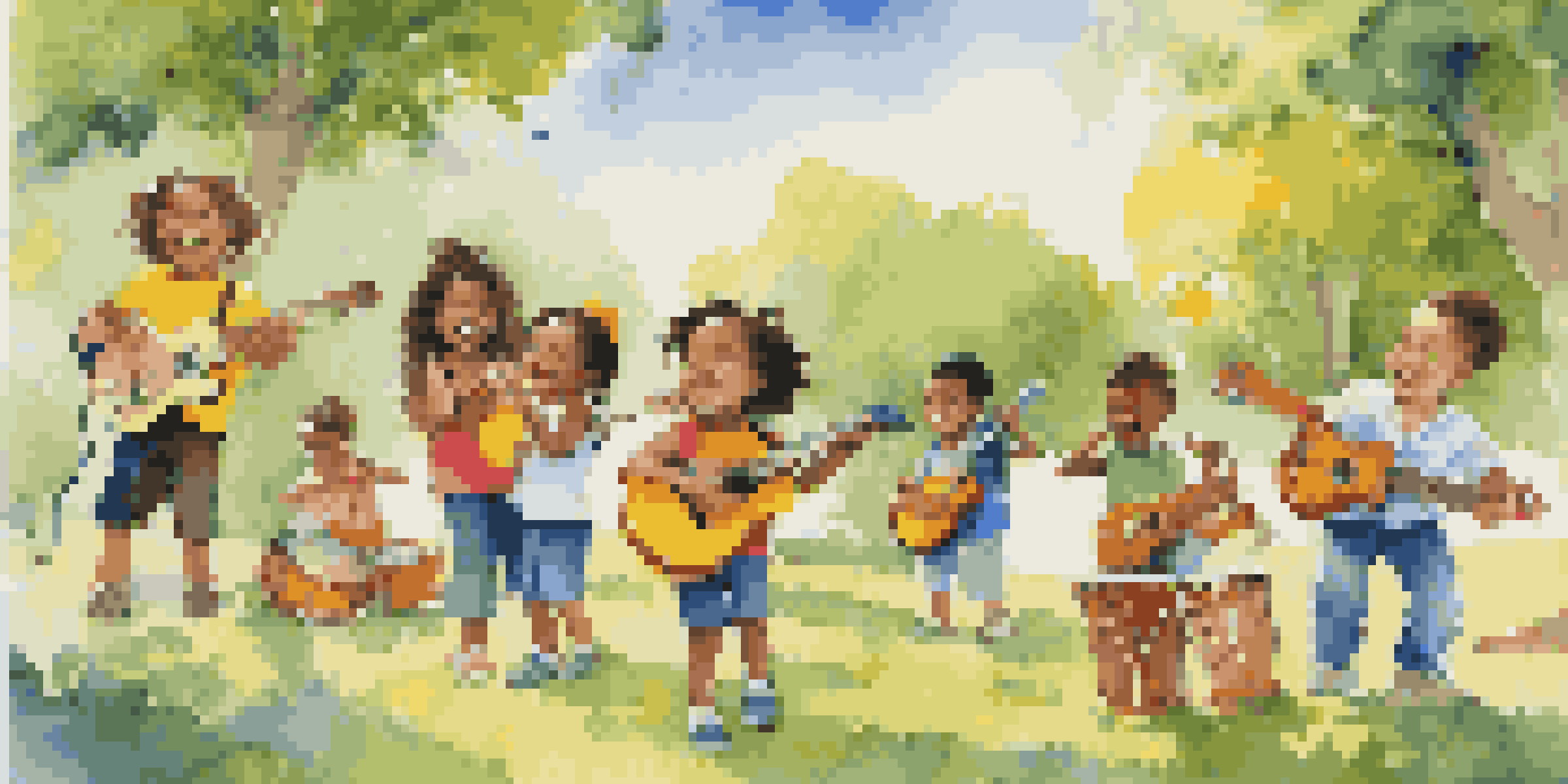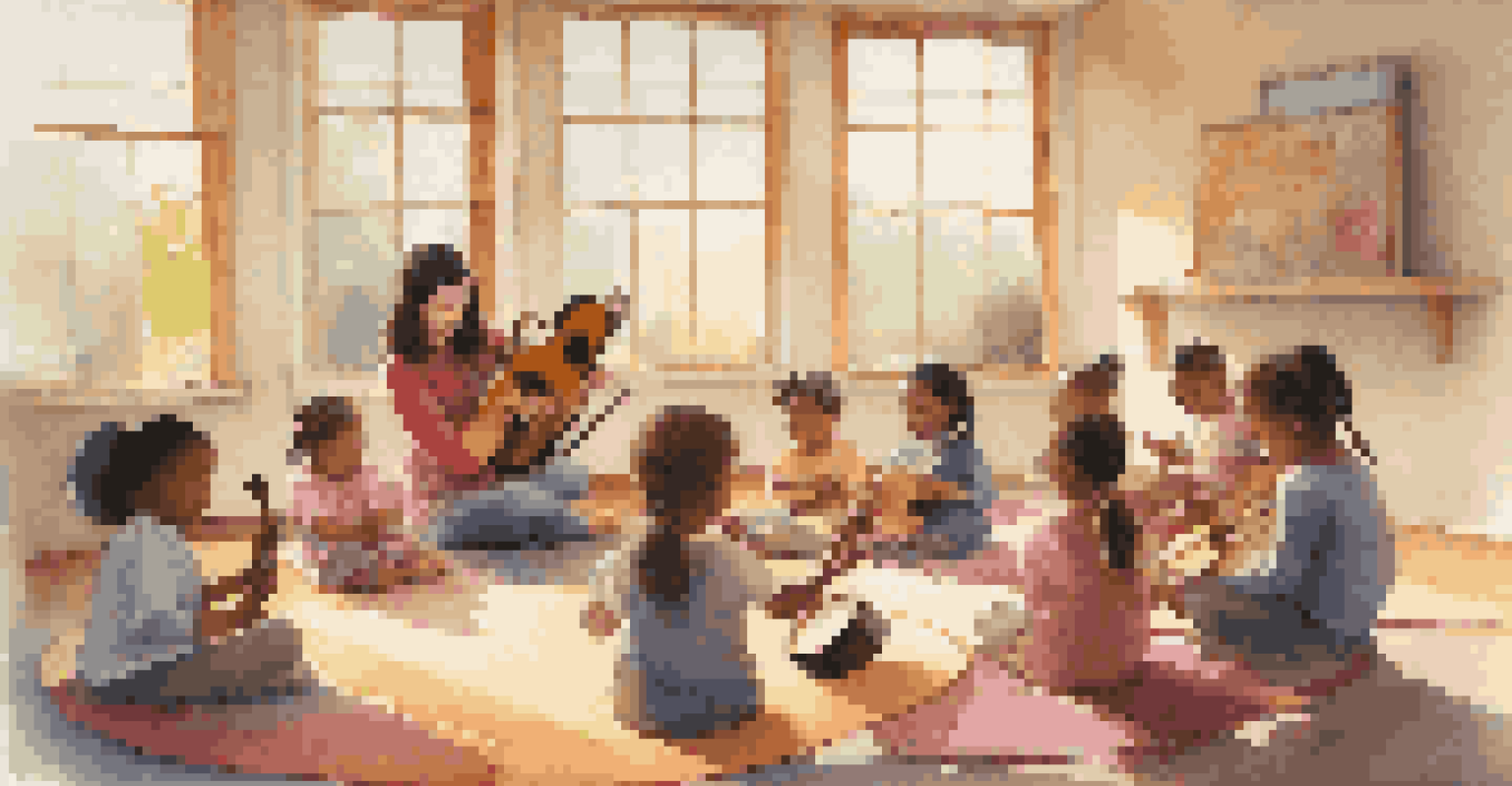The Role of Music in Child Development Across Cultures

Music as a Universal Language in Child Growth
Music knows no boundaries; it's a universal language that connects people across cultures. For children, engaging with music helps nurture emotional expression and creativity. From lullabies in the West to rhythmic chants in Africa, music plays a pivotal role in shaping a child's early experiences.
Music can change the world because it can change people.
This universal aspect of music allows children to communicate feelings even before they can speak. For instance, a baby may coo along to a melody, showcasing their emotional response. These interactions lay the foundation for social skills and emotional intelligence.
Moreover, music encourages children to explore their cultural identities. As they learn songs from their heritage, they develop a sense of belonging and pride, fostering self-esteem that benefits their overall development.
Cognitive Benefits of Music in Early Childhood
Engaging with music can significantly enhance cognitive development in children. Research shows that children who participate in music lessons often perform better in subjects like math and reading. This is because music helps develop critical thinking and pattern recognition skills.

For example, learning to play an instrument requires concentration and memory, engaging the brain in ways that promote overall cognitive growth. Children often learn to identify notes and rhythms, which can translate to better language skills.
Music Boosts Emotional Growth
Engaging with music helps children express emotions and fosters emotional intelligence through interaction.
Additionally, music encourages creativity and problem-solving. When children improvise melodies or lyrics, they practice thinking outside the box, a skill invaluable in their schooling and future careers.
Emotional Development Through Musical Interaction
Music has a profound impact on emotional development, providing children with tools to express their feelings. Singing along to a favorite song can evoke joy, while slower melodies may help them process sadness. This emotional engagement is crucial for healthy psychological growth.
The beautiful thing about learning is that no one can take it away from you.
For instance, children often use music to navigate their emotions, turning to uplifting tunes during happy moments or calming melodies when feeling overwhelmed. This ability to connect with music fosters resilience and emotional regulation.
Moreover, group music activities, like singing or drumming together, encourage social bonding. This communal aspect of music builds empathy and understanding, traits essential for healthy relationships throughout life.
Cultural Variations in Musical Practices for Children
Different cultures incorporate music uniquely into child-rearing practices, reflecting their values and beliefs. For example, in some Indigenous cultures, music is an integral part of storytelling, passing down traditions and teachings through song. This not only educates but also connects children to their heritage.
In contrast, Western cultures often emphasize structured music education, such as formal lessons and choirs. While this approach provides technical skills, it might lack the spontaneous joy found in more traditional practices. Each method has its merits and can contribute to a child's development in different ways.
Cognitive Skills Through Music
Participation in music enhances cognitive development, improving skills such as critical thinking and pattern recognition.
Understanding these cultural variations enriches our perspective on child development. It highlights the importance of adapting musical experiences to fit diverse backgrounds, ensuring that all children can benefit from music's nurturing power.
The Role of Music in Social Skills Development
Participating in musical activities can greatly enhance a child's social skills. Group music-making, whether it's singing in a choir or playing in a band, encourages teamwork and collaboration. Children learn to listen to one another, share ideas, and work towards a common goal.
For instance, when children perform together, they develop a sense of belonging and mutual respect. This experience teaches them about cooperation and compromise, skills that are crucial for building friendships and navigating social interactions.
Furthermore, music can also serve as an icebreaker among peers, making it easier for children to connect and form bonds. Whether it's sharing playlists or discussing favorite artists, music provides common ground that fosters friendships.
Music and Physical Development in Young Children
Music isn't just about listening; it's also a fantastic way to promote physical development in children. Activities like dancing to music help improve coordination, balance, and motor skills. As children move to the beat, they engage their bodies in a fun and natural way.
For example, simple movements like clapping or stomping can enhance rhythm and timing, which are foundational skills for various physical activities. As they grow, these skills can translate into sports or other physical pursuits, fostering a healthy lifestyle.
Social Skills via Musical Activities
Group music-making promotes teamwork and social skills, helping children build connections and friendships.
Additionally, musical games that involve movement, such as freeze dance, encourage children to follow instructions while developing body awareness. This combination of music and movement lays the groundwork for lifelong physical fitness.
Encouraging Musical Exploration at Home and School
To harness the benefits of music in child development, it's essential to encourage musical exploration both at home and in educational settings. Parents can create an environment rich in musical experiences by playing a variety of genres and introducing instruments. This exposure fosters curiosity and encourages children to express themselves musically.
In schools, integrating music into the curriculum can enhance learning across subjects. Music education programs can provide structured opportunities for children to learn about rhythm, melody, and musical history, making learning more engaging.

Moreover, community programs and workshops can offer children additional avenues to explore music. By connecting them with local musicians or music classes, we provide valuable experiences that can shape their musical journey and development.